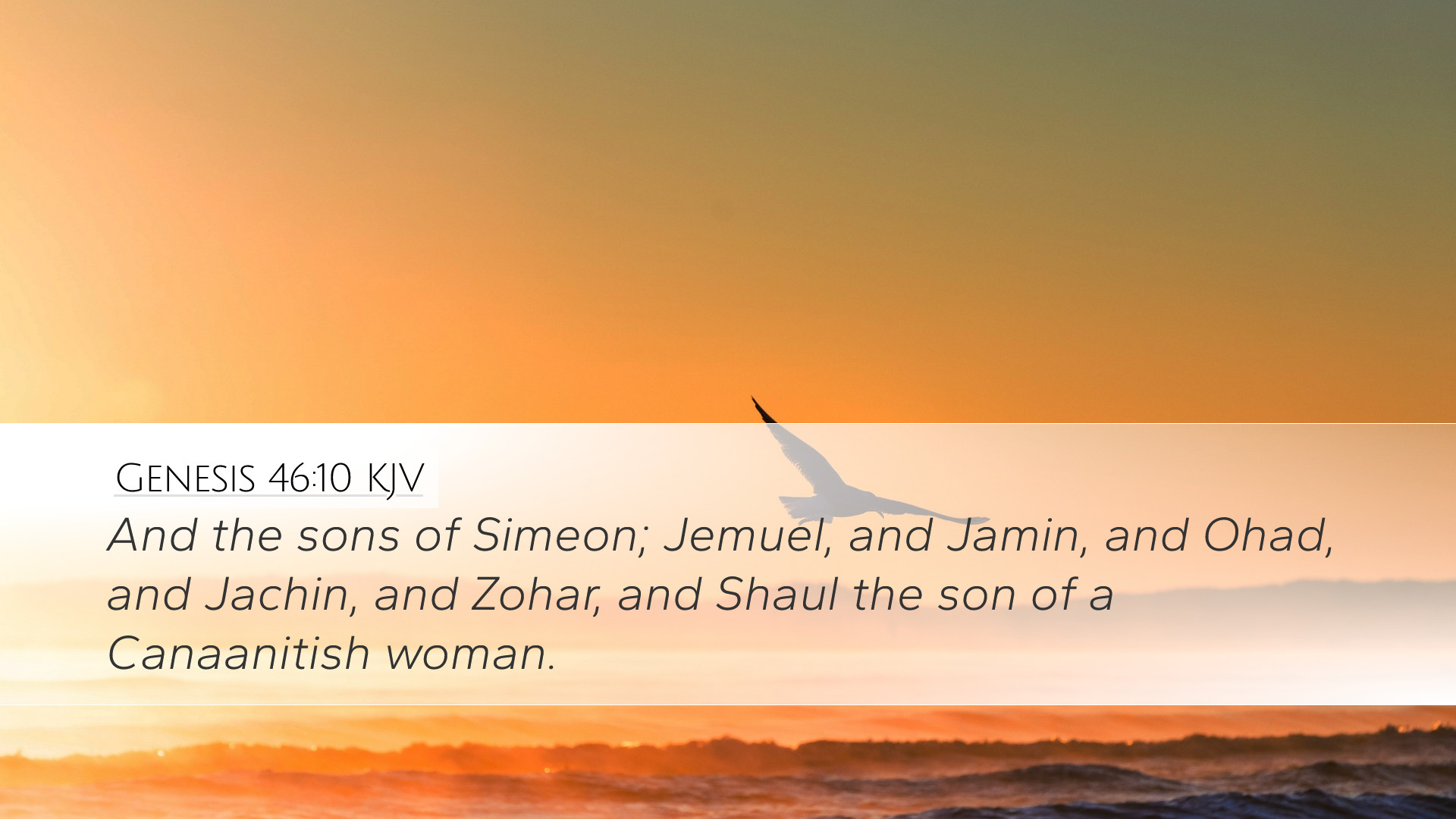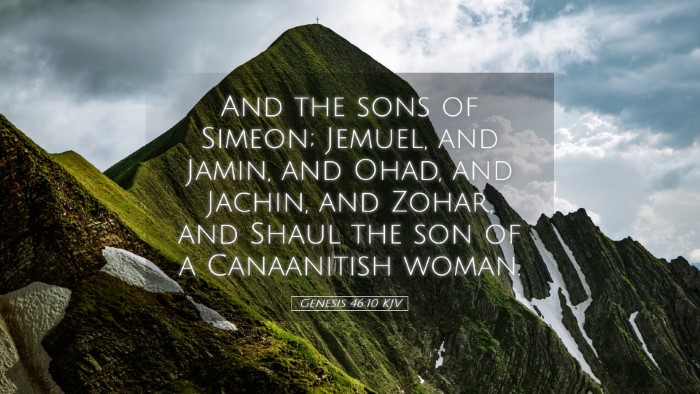Commentary on Genesis 46:10
Genesis 46:10 states: “The sons of Simeon: Jemuel, and Jamin, and Ohad, and Jachin, and Zohar, and Shaul the son of a Canaanitish woman.” This verse is a genealogical record that holds significance within the broader narrative of Israel's formation as a nation. This commentary synthesizes insights from notable public domain biblical scholars including Matthew Henry, Albert Barnes, and Adam Clarke.
Historical Context
This verse occurs during the pivotal moment when Jacob (Israel) relocates his family to Egypt to escape famine. This migration marks a significant transition in the Israelite story, leading to their eventual enslavement and subsequent exodus from Egypt.
Genealogical Significance
Genealogies in the Bible are not mere lists of names; they serve several important functions:
- Identity and Heritage: They establish the identity of tribes and family lines, signifying who belongs to the covenant community. This reflects God's promises to the patriarchs.
- Fulfillment of Promises: The naming of Jacob's descendants fulfills God's covenantal promise to make Abraham's descendants a great nation (Genesis 12:2).
- God’s Sovereignty: These lists highlight God’s providential hand in preserving a people for Himself, as reflected in the lineage to Jesus Christ through Judah later in the scriptures.
Exegesis of the Names
In Genesis 46:10, we find the names of Jacob's sons by his wife Leah. Each name could potentially convey meaning and insight into the character and future of the tribes they represent:
- Jemuel: His name may stem from 'God has heard,' indicating divine awareness of human plight.
- Jamin: This name can mean 'to return' or 'to be restored,’ suggesting a theme of redemption.
- Ohad: His name means ‘strong’ or ‘a helper,’ indicating support within the tribes.
- Jachin: This name signifies 'he will establish,' hinting at God’s plan to establish the people of Israel.
- Zohar: Meaning ‘brightness,’ it could reflect the promise of a prominent future for the tribe.
- Shaul: His designation as 'the son of a Canaanitish woman' is significant, suggesting the importance of lineage and mixed ancestry within biblical narrative.
The Role of Simeon
Simeon, the second son of Jacob and Leah, plays a crucial role in biblical history. The tribe of Simeon later becomes associated with violence and enmity (Genesis 34:25-31), which affects their standing among the other tribes. This complexity suggests a duality of purpose, where the line can lead to both conflict and reconciliation within God's overarching plan for His people.
Theological Implications
Genesis 46:10 and its genealogical focus reflects a deeper theological context: the idea that God is intimately involved in the lives of His people. Each name carries weight and indicates God’s unfolding purpose:
- Covenant and Blessing: The genealogy underscores the covenantal promise wherein each family is chosen for a purpose within God's sovereign plan.
- Restoration and Hope: The tribes, through their names, reflect the hope of restoration and future blessing despite their context at the time of relocation.
- The Impact of Environment: The mention of Shaul as the son of a Canaanitish woman suggests the complexities of faith within diverse contexts, challenging believers to consider how external influences shape their community.
Application for Today
For pastors, students, and theologians, Genesis 46:10 serves as a reminder of the weight of heritage in Christian faith. The importance of lineage and names in the scripture calls believers today to reflect on their identity in Christ:
- Identity in Christ: Understanding that we, like those listed, are part of a larger narrative that God is weaving.
- Calling and Purpose: Each person has a significant role to play in God’s redemptive story, encouraging participants in the faith to view their lives as part of a divine plan.
- Embracing Diversity: Acknowledging mixed heritage and backgrounds within the church, celebrating the diversity that can enrich community life.
Conclusion
Genesis 46:10 presents a critical moment in biblical history through the genealogical line of Simeon, encapsulating themes of identity, heritage, and God's faithfulness. This verse prompts reflection on how we view our own spiritual lineage and God's active role throughout history, shaping not just individuals, but entire nations. Just as the names listed here contribute to the unfolding of God’s ultimate plan, so too do each of us, as we continue to trust in His promises for the future.


